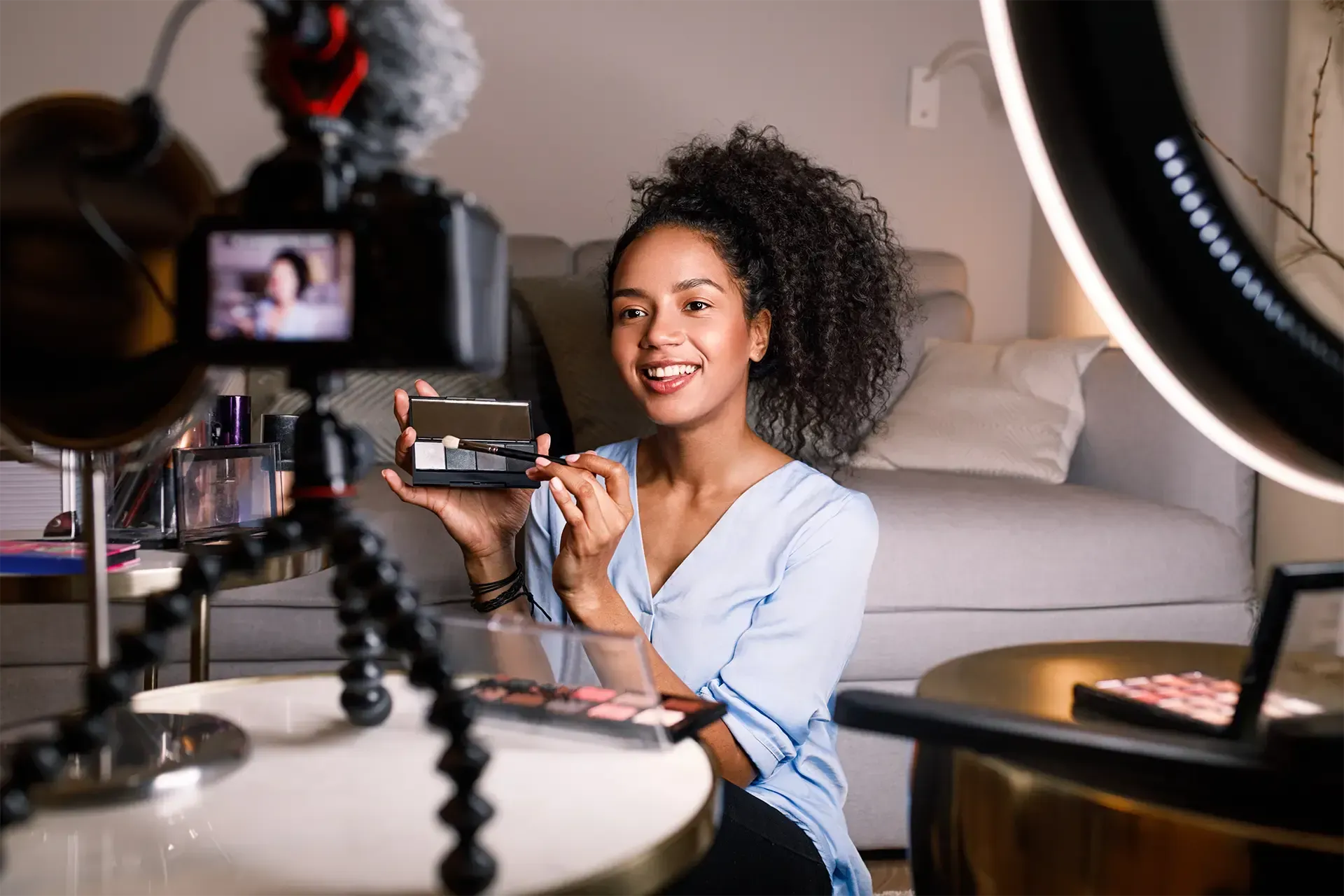Our Blog
Below you’ll find lots of useful information that answers the most common questions we hear from people just like you. Feel free to browse through relevant categories to find what you’re looking for.
Dubai

If you're a content creator or influencer operating in Dubai or the UAE, or are thinking about making the move, there's a crucial update you need to know about. The UAE has just implemented new rules that could land you with fines of up to AED 1 million if you get it wrong. The new law came into effect on 29th May , and it's changed the licensing landscape for content creators and influencers operating in the UAE. However, if you’re a creator, there’s no need to panic just yet. What's Changed? Here's the bottom line: you now need TWO licences instead of one. Previously, content creators only needed a media licence from the UAE Media Council. That's no longer enough. The new law requires you to obtain a business licence first, before you can even apply for your media licence. You are now required to have: 1. A Commercial Licence (Trade or Freelance) This is your business foundation - the licence that allows you to legally operate and earn money in the UAE. 2. A Media Licence from the UAE Media Council This specifically authorises you to create and distribute content as an influencer or content creator. Who Actually Needs These Licences? If you're earning money from content creation in the UAE, this applies to you. That includes: Brand collaborations and sponsored posts Affiliate marketing commissions Product sales through your channels YouTube AdSense revenue Any paid partnerships or promotions Currently, the UAE Media Council is offering a free permit to content creators needing the business licence for the next three years, in order to adapt to the new regulations. Step 1: Getting Your Commercial Licence Sorted You'll need to obtain this from either a Free Zone authority or the Department of Economic Development (DED) on the mainland. This licence allows you to sponsor a visa and register a legal business entity. The Freelance Route For most content creators, a freelance licence is the sensible starting point. You can obtain one from many free zones like Meydan, Dubai Media City, Fujairah Creative City, RAKEZ, or IFZA. Expect to pay between AED 5,000 and AED 15,000, depending on which zone you choose. Why freelance licences work well for creators: Lower setup costs than full trade licences Tax-free income up to 1 million dirhams Simpler compliance requirements Perfect for solo operators The Trade Licence Option If you're planning to hire staff or run a larger operation, a trade licence gives you more flexibility. This allows you to sponsor dependents and operate as a full business entity, though it comes with higher costs and more compliance requirements. Abu Dhabi Law Abu Dhabi has been particularly proactive - since 2024, the Abu Dhabi Department of Economic Development (ADDED) has mandated that all influencers must hold a trade licence . Get caught without one and you're looking at fines of up to AED 10,000. Step 2: Apply for Your Media Licence Once your commercial licence is sorted, you can apply for your media licence from the UAE Media Council . This costs AED 1,000 per year, including renewal. The UAE Media Council offers various permits, including: Licences for advertising or media content Audio and visual podcasting permits Temporary licences for visiting creators The Content Rules You Need to Follow Getting licensed is just the start. The new law establishes 20 mandatory content standards that you must follow. Break these rules and the penalties can be eye-watering. Penalties That Could Cost You Big Religious and State Violations: Disrespecting Islamic beliefs or other religions: Up to AED 1 million Insulting state symbols or leadership: Up to AED 500,000 Undermining national unity: Up to AED 250,000 Content-related Violations: Publishing false information: AED 5,000 to AED 150,000 Promoting destructive ideas: Up to AED 100,000 Inciting criminal behaviour: Up to AED 150,000 Licensing Violations: Operating without a licence: AED 10,000 first offence, AED 40,000 for repeat offences The UAE Media Council has the authority to monitor and remove content that breaches these rules, so this isn't just theoretical - it's actively enforced. Content Creator Action Plan 1. Assess Where You Stand Right Now If you're already creating monetised content in the UAE without proper licensing, you need to act immediately. The enforcement mechanisms are real and active. 2. Choose Your Licence Structure The choice between freelance and trade licence depends on your business model, income level, and long-term plans. Consider: Your annual revenue projections Whether you plan to hire staff Your visa and residency needs Tax implications for your specific situation 3. Budget for the Full Cost You're looking at AED 5,000 - AED 15,000 for your commercial licence, plus AED 1,000 annually for your media licence. Factor in ongoing compliance costs too. 4. Get Your Business Processes Right With formal licensing comes proper business obligations - accounting, tax compliance, and regulatory reporting. Make sure you get these right from the start. Get This Right From the Start If you're operating in the UAE or considering the move, don't wait to address these requirements. The enforcement is real, the penalties are substantial, and the compliance process takes time. At Capture Accounting, we specialise in helping content creators working in Dubai or considering the move to navigate these complex licensing requirements. We've guided creators through the entire UAE business setup process - from choosing between freelance and trade licences to maintaining compliance whilst keeping their UK business interests optimised. We know your industry inside out and understand that getting the structure right from day one is crucial for long-term success. Are you ready to ensure your UAE content creation business is properly structured and compliant? Book a discovery call with us to discuss your specific situation and ensure you're operating legally and efficiently in the UAE's evolving regulatory landscape.

The UAE recently announced a new opportunity for creative professionals - the Golden Visa for creators. With a massive $40.8 million initiative aimed at attracting 10,000 content creators, this program is changing the game for influencers, artists, and digital entrepreneurs. Introduced earlier this year at the 1 Billion Followers Summit, the UAE isn't just offering a visa; they're rolling out the red carpet for digital creators. This program aims to attract global talent and build a thriving digital community in the UAE. Let's look at what this visa offers and why it's exciting for influencers and content creators. Key Features of UAE Golden Visa for Creators 10-year renewable residency permit No sponsor required Family sponsorship allowed 100% business ownership permitted Access to world-class digital infrastructure Tax-free income environment Aimed at attracting 10,000 content creators Eligibility includes social media influencers, podcasters, and visual artists Backed by a $40.8 million government initiative Creators HQ support hub in Emirates Towers, Dubai What is the UAE Golden Visa for Creators? The UAE Golden Visa for creators is a long-term residency permit for content creators, influencers, and digital entrepreneurs. It offers a 10-year renewable visa, letting creative professionals live and work in the UAE without needing a sponsor. This is part of the UAE's plan to grow its economy and become a global centre for innovation and digital content creation. Who is Eligible? The Golden Visa is for many types of creative professionals, including: Social media influencers on platforms like Instagram, YouTube, and TikTok Digital content creators in areas like lifestyle, tech, fashion, and more Podcasters making interesting audio content Visual artists creating digital art, animations, and graphic designs Filmmakers and videographers making high-quality videos Writers and bloggers with a big online presence AR/VR content creators making new kinds of experiences To be eligible, it isn't just about having a lot of followers. The UAE is looking for creators who truly stand out. You might be the perfect candidate if you: Have a proven track record of impactful content that makes a real difference Boast awards or recognition in your creative field Show the potential to add serious value to the UAE's creative ecosystem Demonstrate consistent growth and meaningful engagement in your content efforts The Application Process Applying for the UAE Golden Visa is simple and can be done through the official Creators HQ website . Here’s what you’ll need to do: Fill out the application form on the Creators HQ website . You’ll receive a nomination email once approved to confirm your eligibility. The application and nomination process takes between 4 to 10 weeks. Once you receive the email, you can head to Smart Salem Index Towers in DIFC for a medical test (You’ll need your passport, Emirates ID and a personal photo). Then visit the Services 1 Centre at the Jumeirah Emirates Towers where you can get your Golden Visa. Get your new Emirates ID from the Federal Authority for Identity, Citizenship, Customs, and Port Security. During this process you’ll need to cancel any existing UAE visa before getting your Golden visa. Dubai's Creators HQ Initiative To support new creative talent, Dubai has started the Creators HQ initiative . This program is designed to help and empower content creators, offering: Over 300 yearly events for creators, including workshops, seminars, and networking sessions Chances to network with industry leaders, brands, and other creators Access to modern facilities, including recording studios, editing suites, and co-working spaces Collaborations with big tech platforms like Meta, X, and TikTok Mentorship programs pairing experienced creators with newcomers Legal and financial advice tailored to the creative industry Showcases and exhibitions to highlight creators' work to a global audience The Creators HQ is set to become a centre for innovation and creativity in the region, making the Golden Visa program even more appealing. Located in the Emirates Towers, it offers a central spot for creators to work, collaborate, and grow their businesses in the heart of Dubai's business district. Is the UAE Golden Visa Right for You? The UAE Golden Visa is a transformative opportunity for creators ready to elevate their career. It's competitive, not everyone will get in, and your application needs to truly stand out in the nomination process. At Capture, we can assist you with moving to Dubai and setting up your business, ensuring you hold the necessary licenses to build a successful creative business in the UAE. Our team specialises in helping creators navigate the visa application process, business setup requirements, and everything in between. If you're looking to make the move, contact Capture Accounting to kickstart your journey to the UAE.
Influencers

If you're a content creator or influencer operating in Dubai or the UAE, or are thinking about making the move, there's a crucial update you need to know about. The UAE has just implemented new rules that could land you with fines of up to AED 1 million if you get it wrong. The new law came into effect on 29th May , and it's changed the licensing landscape for content creators and influencers operating in the UAE. However, if you’re a creator, there’s no need to panic just yet. What's Changed? Here's the bottom line: you now need TWO licences instead of one. Previously, content creators only needed a media licence from the UAE Media Council. That's no longer enough. The new law requires you to obtain a business licence first, before you can even apply for your media licence. You are now required to have: 1. A Commercial Licence (Trade or Freelance) This is your business foundation - the licence that allows you to legally operate and earn money in the UAE. 2. A Media Licence from the UAE Media Council This specifically authorises you to create and distribute content as an influencer or content creator. Who Actually Needs These Licences? If you're earning money from content creation in the UAE, this applies to you. That includes: Brand collaborations and sponsored posts Affiliate marketing commissions Product sales through your channels YouTube AdSense revenue Any paid partnerships or promotions Currently, the UAE Media Council is offering a free permit to content creators needing the business licence for the next three years, in order to adapt to the new regulations. Step 1: Getting Your Commercial Licence Sorted You'll need to obtain this from either a Free Zone authority or the Department of Economic Development (DED) on the mainland. This licence allows you to sponsor a visa and register a legal business entity. The Freelance Route For most content creators, a freelance licence is the sensible starting point. You can obtain one from many free zones like Meydan, Dubai Media City, Fujairah Creative City, RAKEZ, or IFZA. Expect to pay between AED 5,000 and AED 15,000, depending on which zone you choose. Why freelance licences work well for creators: Lower setup costs than full trade licences Tax-free income up to 1 million dirhams Simpler compliance requirements Perfect for solo operators The Trade Licence Option If you're planning to hire staff or run a larger operation, a trade licence gives you more flexibility. This allows you to sponsor dependents and operate as a full business entity, though it comes with higher costs and more compliance requirements. Abu Dhabi Law Abu Dhabi has been particularly proactive - since 2024, the Abu Dhabi Department of Economic Development (ADDED) has mandated that all influencers must hold a trade licence . Get caught without one and you're looking at fines of up to AED 10,000. Step 2: Apply for Your Media Licence Once your commercial licence is sorted, you can apply for your media licence from the UAE Media Council . This costs AED 1,000 per year, including renewal. The UAE Media Council offers various permits, including: Licences for advertising or media content Audio and visual podcasting permits Temporary licences for visiting creators The Content Rules You Need to Follow Getting licensed is just the start. The new law establishes 20 mandatory content standards that you must follow. Break these rules and the penalties can be eye-watering. Penalties That Could Cost You Big Religious and State Violations: Disrespecting Islamic beliefs or other religions: Up to AED 1 million Insulting state symbols or leadership: Up to AED 500,000 Undermining national unity: Up to AED 250,000 Content-related Violations: Publishing false information: AED 5,000 to AED 150,000 Promoting destructive ideas: Up to AED 100,000 Inciting criminal behaviour: Up to AED 150,000 Licensing Violations: Operating without a licence: AED 10,000 first offence, AED 40,000 for repeat offences The UAE Media Council has the authority to monitor and remove content that breaches these rules, so this isn't just theoretical - it's actively enforced. Content Creator Action Plan 1. Assess Where You Stand Right Now If you're already creating monetised content in the UAE without proper licensing, you need to act immediately. The enforcement mechanisms are real and active. 2. Choose Your Licence Structure The choice between freelance and trade licence depends on your business model, income level, and long-term plans. Consider: Your annual revenue projections Whether you plan to hire staff Your visa and residency needs Tax implications for your specific situation 3. Budget for the Full Cost You're looking at AED 5,000 - AED 15,000 for your commercial licence, plus AED 1,000 annually for your media licence. Factor in ongoing compliance costs too. 4. Get Your Business Processes Right With formal licensing comes proper business obligations - accounting, tax compliance, and regulatory reporting. Make sure you get these right from the start. Get This Right From the Start If you're operating in the UAE or considering the move, don't wait to address these requirements. The enforcement is real, the penalties are substantial, and the compliance process takes time. At Capture Accounting, we specialise in helping content creators working in Dubai or considering the move to navigate these complex licensing requirements. We've guided creators through the entire UAE business setup process - from choosing between freelance and trade licences to maintaining compliance whilst keeping their UK business interests optimised. We know your industry inside out and understand that getting the structure right from day one is crucial for long-term success. Are you ready to ensure your UAE content creation business is properly structured and compliant? Book a discovery call with us to discuss your specific situation and ensure you're operating legally and efficiently in the UAE's evolving regulatory landscape.

As a TikTok creator, you might have wondered, ‘Is there VAT on TikTok income?’. If you're earning money through TikTok as a UK creator, understanding your VAT obligations could save you thousands in penalties and unnecessary registrations. The Three Ways TikTok Pays Creators Before diving into VAT specifics, it's crucial to understand that TikTok operates three distinct payment systems, each with different tax implications: 1. TikTok Creator Rewards Program Payment based on views, engagement, and content performance. This replaced the Creator Fund and is the traditional "per view" income that most creators associate with platform monetisation. 2. TikTok Shop Sales Direct selling of physical or digital products through TikTok's integrated e-commerce platform. You're acting as a retailer, selling goods directly to consumers. 3. Affiliate Commission Earning commission by promoting other businesses' products through TikTok Shop. You're paid a percentage when someone purchases through your affiliate link. Each income stream has vastly different VAT implications, and mixing them up is one of the costliest mistakes UK creators make. This guide focuses specifically on TikTok Creator Rewards Program income and its VAT treatment. TikTok VAT: How it Works Here's where it gets complicated: not all Creator Rewards Program income is treated the same way for UK VAT purposes. The key factor is which TikTok entity is paying you. As a TikTok creator, you will receive Creator Rewards Program payments from TikTok Technologies Ltd or through TikTok Pipo Europe. If it's UK-sourced, it can show up on Stripe as ‘TikTok Technologies Ltd’ on your statements. When Creator Rewards Income is Subject to UK VAT UK creators are paid directly by TikTok Technologies Limited (the UK entity). When this occurs, your Creator Rewards income becomes subject to standard UK VAT rules: It counts towards the £90,000 VAT registration threshold Once registered, you must charge 20% VAT on this income You must issue proper VAT invoices How to Determine Which Entity Pays You Check your payment notifications and bank statements. The paying entity should be clearly identified. Look for: TikTok Pipo Europe: Generally outside UK VAT scope TikTok Technologies Limited: Subject to UK VAT rules At Capture Accounting, we've seen creators panic about VAT registration when 90% of their income was actually outside the scope of VAT. We've also helped creators who missed their VAT registration deadline because they assumed all TikTok income was exempt. The VAT Registration Threshold You must register for VAT when your UK taxable turnover exceeds £90,000 in any rolling 12-month period. The crucial word here is ‘taxable’, only income subject to UK VAT counts towards this threshold. What Counts Towards Your VAT Threshold Creator Rewards income from TikTok Technologies Limited (UK entity) UK sponsorship and brand partnership income UK-based affiliate commission Any other UK business-to-consumer services What Doesn't Count Creator Rewards income from overseas TikTok entities International brand partnerships with non-UK companies Affiliate commissions from overseas businesses Reporting Your TikTok Income Even if your Creator Rewards income is outside VAT scope, you must still report it for income tax purposes if it exceeds the £1,000 trading allowance. All TikTok Creator Rewards Program income counts as business income for income tax, regardless of which entity pays you. This means: Register for self-assessment when earnings exceed £1,000 annually Pay income tax on profits (income minus allowable expenses) Keep detailed records of all payments received Common VAT Mistakes with Creator Rewards Income Through working with TikTok creators, we've identified these frequent errors: 1. Assuming all TikTok Income is VAT-free Many creators incorrectly believe all platform income is outside UK VAT scope, missing registration requirements when paid by UK entities. 2. Registering for VAT Unnecessarily Conversely, some creators register for VAT based on total TikTok income, not realising most of it doesn't count towards the threshold. 3. Mixing Income Streams Combining Creator Rewards, Shop sales, and affiliate commission without understanding their different VAT treatments. 4. Poor Record Keeping Not tracking which TikTok entity makes each payment, making VAT compliance difficult to determine accurately. Expense Claims Against Creator Rewards Income Regardless of VAT treatment, you can claim legitimate business expenses against Creator Rewards income: Equipment and Technology Cameras, microphones, and lighting Computers, phones, and editing software Internet and phone contracts Content Creation Costs Props and materials Location hire or travel Professional services (editing, design) Home Office Expenses Proportion of rent, utilities, and council tax Office furniture and equipment Insurance and maintenance If you’d like to learn what else you could claim as expenses through your content, check out our blog post on tax deductions for creators . Next Steps for TikTok Creators Identify Your Payment Source : Check which TikTok entity pays your Creator Rewards income to determine VAT treatment. Track Your Threshold : Monitor only the income streams that count towards the £90,000 VAT threshold. Separate Your Income Streams : Keep Creator Rewards, Shop sales, and affiliate income clearly separated in your records. Register When Required : Don't delay VAT registration if you cross the threshold with qualifying income. Maintain Proper Records : Document all payments, expenses, and the source of each income stream. VAT compliance for TikTok creators isn't straightforward, especially when dealing with multiple income streams and international payments. Understanding the difference between which payments count towards your threshold and which don't could save you thousands in unnecessary VAT registrations or penalties. At Capture Accounting, we work exclusively with content creators and online businesses, helping hundreds of creators navigate these complexities while ensuring they're compliant without overpaying tax. Contact us today for a discovery call to get your TikTok income properly structured from the start.

As a content creator, you’re probably busy managing content across many platforms, embracing any opportunities coming along your way. You may take sponsorship deals and pull in ad revenue while enjoying life as a content creator. However, here are some mistakes to watch out for that could cost you financially. Mistake #1 - Value Added Tax (VAT) Rules A common mistake many creators make is not knowing about VAT and when it applies. You should be aware of where your customer is to ensure your business has the correct tax treatment. Not knowing the difference between a digital service supply and a normal supply can lead to ramifications. Essentially, a digital service supply is classed as a supply without human interaction, e.g. an e-book, webinar, or selling a course online. The VAT threshold in the UK is £90,000 of turnover, so VAT must be added to any courses or services you provide when you reach that threshold. However, if you are selling abroad the VAT rules may be different, so you need to check depending on the countries your customers are located. For example, selling a course in the EU, an e-book, webinar or downloadable would require you to put VAT on each sale. Check with your accountant to ensure you are abiding by VAT rules. To learn more about VAT for content creators, have a read of our VAT guide . Mistake #2 - Poor Record Keeping Another key mistake content creators make is poor record keeping or not keeping records at all. The admin work behind your business isn’t glamorous at all, but, it's crucial to understand where your business is at and how you could invest to continue growing. Content creation can be volatile, so understanding your funds, cash flow, and what you can claim against tax can keep you at ease. Ensuring you are claiming for enough of your expenses will also keep your tax bill down. The way to understand the taxes you are due will be based on the records you keep. Having a separate bank account for your business can help track how your business is doing, allowing you to plan for growth and make smarter decisions. Additionally, it will be much easier for you (or your accountant) to find the expenses you incurred over the year. This will ensure you are claiming enough but most importantly not overpaying in tax! Mistake #3 - Overlooking expenses You may need an extensive list of equipment or just a smartphone to create content. The good thing is that you can claim these as expenses. An expense often overlooked is your mobile phone bill. A business contract for your phone can bring big tax savings on the one widely used item to create content. Think about all the things you buy for content, such as cameras and lighting. These can all be expenses you can claim. Another expense that is often overlooked is the home studio or set-up for content creation. If you do have this set-up then you can claim a proportion of the running costs of your property, including utility bills and internet costs. A less obvious expense is if you travel for content creation, which could be a deductible expense too. One thing that you must do is to keep track of all your expenses. Keep any receipts and use a spreadsheet or app to log all your expenses. Your future self will be grateful, and so will your accountant! Mistake #4 - Not claiming for Withholding Tax The US brought in a digital tax on digital service supplies, mainly on Google, Meta, etc. This will apply if you have US viewership on your content. For example, if you have US viewership on YouTube, you will receive a 30% deduction at source for AdSense earnings. However, the US and the UK have strong tax treaties that allow you to claim a 0% withholding tax, which involves submitting forms to the Internal Revenue Service (IRS). This is often missed, so once you incur the deduction, you then have to claim for the tax credit later. Instead, you could submit the forms initially to have that extra 30% in your pocket, to put towards creating your next piece of content or to invest as you please. Mistake #5 - Thinking short-term Many people don’t think about how long they will continue creating content. You might be enjoying the thrill of life as an influencer. However, thinking about the future can safeguard you and put you in a better place once you decide to stop being a creator. The average influencer career is unlike a traditional corporate job, so it's wise to think about how you will use your money to best prepare for your future. Consider diversifying your income streams. While your YouTube channel may be the priority, having multiple income streams can provide financial stability and protect you from the algorithms and fluctuations in income. Whether you want to invest your money or keep contributing to your pension, there are plenty of ways to reduce your current tax bill and benefit in the future. The Bottom Line Being a content creator is awesome, but it comes with financial challenges. Avoid these common money mistakes and set yourself up for long-term success. Remember, it’s not just about making money, but also managing it wisely! If you need help with your finances, Capture Accounting is here to help. We’re specialist accountants for content creators, so we know what you’re dealing with. If you'd like to chat about your finances and see how we can help, book a call with us today.

The UAE recently announced a new opportunity for creative professionals - the Golden Visa for creators. With a massive $40.8 million initiative aimed at attracting 10,000 content creators, this program is changing the game for influencers, artists, and digital entrepreneurs. Introduced earlier this year at the 1 Billion Followers Summit, the UAE isn't just offering a visa; they're rolling out the red carpet for digital creators. This program aims to attract global talent and build a thriving digital community in the UAE. Let's look at what this visa offers and why it's exciting for influencers and content creators. Key Features of UAE Golden Visa for Creators 10-year renewable residency permit No sponsor required Family sponsorship allowed 100% business ownership permitted Access to world-class digital infrastructure Tax-free income environment Aimed at attracting 10,000 content creators Eligibility includes social media influencers, podcasters, and visual artists Backed by a $40.8 million government initiative Creators HQ support hub in Emirates Towers, Dubai What is the UAE Golden Visa for Creators? The UAE Golden Visa for creators is a long-term residency permit for content creators, influencers, and digital entrepreneurs. It offers a 10-year renewable visa, letting creative professionals live and work in the UAE without needing a sponsor. This is part of the UAE's plan to grow its economy and become a global centre for innovation and digital content creation. Who is Eligible? The Golden Visa is for many types of creative professionals, including: Social media influencers on platforms like Instagram, YouTube, and TikTok Digital content creators in areas like lifestyle, tech, fashion, and more Podcasters making interesting audio content Visual artists creating digital art, animations, and graphic designs Filmmakers and videographers making high-quality videos Writers and bloggers with a big online presence AR/VR content creators making new kinds of experiences To be eligible, it isn't just about having a lot of followers. The UAE is looking for creators who truly stand out. You might be the perfect candidate if you: Have a proven track record of impactful content that makes a real difference Boast awards or recognition in your creative field Show the potential to add serious value to the UAE's creative ecosystem Demonstrate consistent growth and meaningful engagement in your content efforts The Application Process Applying for the UAE Golden Visa is simple and can be done through the official Creators HQ website . Here’s what you’ll need to do: Fill out the application form on the Creators HQ website . You’ll receive a nomination email once approved to confirm your eligibility. The application and nomination process takes between 4 to 10 weeks. Once you receive the email, you can head to Smart Salem Index Towers in DIFC for a medical test (You’ll need your passport, Emirates ID and a personal photo). Then visit the Services 1 Centre at the Jumeirah Emirates Towers where you can get your Golden Visa. Get your new Emirates ID from the Federal Authority for Identity, Citizenship, Customs, and Port Security. During this process you’ll need to cancel any existing UAE visa before getting your Golden visa. Dubai's Creators HQ Initiative To support new creative talent, Dubai has started the Creators HQ initiative . This program is designed to help and empower content creators, offering: Over 300 yearly events for creators, including workshops, seminars, and networking sessions Chances to network with industry leaders, brands, and other creators Access to modern facilities, including recording studios, editing suites, and co-working spaces Collaborations with big tech platforms like Meta, X, and TikTok Mentorship programs pairing experienced creators with newcomers Legal and financial advice tailored to the creative industry Showcases and exhibitions to highlight creators' work to a global audience The Creators HQ is set to become a centre for innovation and creativity in the region, making the Golden Visa program even more appealing. Located in the Emirates Towers, it offers a central spot for creators to work, collaborate, and grow their businesses in the heart of Dubai's business district. Is the UAE Golden Visa Right for You? The UAE Golden Visa is a transformative opportunity for creators ready to elevate their career. It's competitive, not everyone will get in, and your application needs to truly stand out in the nomination process. At Capture, we can assist you with moving to Dubai and setting up your business, ensuring you hold the necessary licenses to build a successful creative business in the UAE. Our team specialises in helping creators navigate the visa application process, business setup requirements, and everything in between. If you're looking to make the move, contact Capture Accounting to kickstart your journey to the UAE.

Let's talk about something that can really transform your content creation journey - brand deals. Whether you're just starting out or looking to level up your partnerships, I'm going to break down exactly what you need to know. What are Brand Deals? Think of brand deals as a win-win partnership - you promote a company's products or services, and they pay you for your influence. A brand deal can be anything from a one-off Instagram post to becoming a long-term brand ambassador. The best part is, there are so many ways to do this now - Instagram stories, YouTube videos, TikTok challenges, podcast sponsorships, you name it! How to Reach Out to Brands (Without Being Awkward) You might be wondering how to get brand deals as an influencer. Well, first impressions matter, so here's how to approach brands professionally: Do your homework! Make sure you know the brand inside out before reaching out Make your pitch personal (nobody likes copy-paste emails!) Highlight what makes you unique Be transparent about your numbers (followers, engagement, etc.) Showcase examples of your best content Here’s a pro tip: Create a well-designed media kit (using tools like Canva) so you can show brands your portfolio, including your brand, audience, past work and what you can offer. Make it count! Pricing Your Work and Negotiating Brand Deals The big questions everyone asks are: how much do brand deals pay? how much should you charge for a brand deal? There's no one-size-fits-all answer, but there’s a few things to keep in mind. It's important to value your work properly. Whether it’s recording 3 Instagram reels or a YouTube video, try to negotiate depending on the deliverables for the campaign. Think about whether it is a one-off project or has the potential to become a longer partnership. You could begin around £100 per 10,000 followers for a single post. But here's the thing - your rates should reflect your unique value. When considering pricing, think about: Your engagement rate (sometimes more important than follower count!) The type of content you're creating How the brand can use your content Any exclusivity requirements Don't be afraid to negotiate - your content is valuable! What to Discuss in a Brand Deal When discussing the deal, make sure to get all the information upfront. Ask the brand if they have any requests when it comes to usage rights or exclusivity (not working with competitors for a specified time). Always get these points clear in writing: Exact deliverables: what exactly are you creating? Timeline: when does it need to go live? Payment terms: how and when will you get paid? Usage rights: can the brand reuse your content? Exclusivity clauses: are you allowed to work with their competitors? Content approval process: any requests to make changes or reshoot? Success metrics: how did the content perform? Once you’ve agreed the deliverables and you reach the contract stage, ensure that the terms in the contract are exactly what you had agreed. Read and double-check the contract! Before you start creating content, ensure you meet the conditions and have any materials the brand requests (or sends you) within the content. Juggling Multiple Brand Deals As you grow, you might find yourself managing several brand deals at once. Here's what you can do to stay organised: Use a content calendar for tracking deadlines Be transparent about your other partnerships Stay true to your personal brand Don't take on more than you can handle Keep your content quality high (quality over quantity!) If you’d like to know more about managing multiple brand deals, check out our blog post here . Building Long-Term Brand Relationships Something most people don't talk about is long-term partnerships. This is where the real magic happens. They can provide a more stable income, which often leads to better opportunities. Thinking of turning a one-off deal into a long-term partnership? If you have a long-term strategy in mind you could think about the potential for further opportunities with the brand after completing your first project. Through your initial collaboration, you could benefit in the long run by doing the following: Over-delivering on your promises Being professional but personable Sharing insights about your audience Keep suggesting fresh ideas Propose fresh collaboration ideas Conclusion The truth is that success with brand deals doesn't happen overnight. But if you have the right approach, you can build a sustainable income stream while creating content you're proud of. If you’re ready to start landing brand deals or want to add more, you should focus on creating valuable content, building genuine connections, and staying true to your audience. Just remember that every successful creator was once in the position where you are now. For any help managing your brand deals or your finances, we’re here to support you. At Capture, we let you focus on what you do best - creating content. Book a call with us to find out how we can support you.
Tax

As a content creator, you’re probably busy managing content across many platforms, embracing any opportunities coming along your way. You may take sponsorship deals and pull in ad revenue while enjoying life as a content creator. However, here are some mistakes to watch out for that could cost you financially. Mistake #1 - Value Added Tax (VAT) Rules A common mistake many creators make is not knowing about VAT and when it applies. You should be aware of where your customer is to ensure your business has the correct tax treatment. Not knowing the difference between a digital service supply and a normal supply can lead to ramifications. Essentially, a digital service supply is classed as a supply without human interaction, e.g. an e-book, webinar, or selling a course online. The VAT threshold in the UK is £90,000 of turnover, so VAT must be added to any courses or services you provide when you reach that threshold. However, if you are selling abroad the VAT rules may be different, so you need to check depending on the countries your customers are located. For example, selling a course in the EU, an e-book, webinar or downloadable would require you to put VAT on each sale. Check with your accountant to ensure you are abiding by VAT rules. To learn more about VAT for content creators, have a read of our VAT guide . Mistake #2 - Poor Record Keeping Another key mistake content creators make is poor record keeping or not keeping records at all. The admin work behind your business isn’t glamorous at all, but, it's crucial to understand where your business is at and how you could invest to continue growing. Content creation can be volatile, so understanding your funds, cash flow, and what you can claim against tax can keep you at ease. Ensuring you are claiming for enough of your expenses will also keep your tax bill down. The way to understand the taxes you are due will be based on the records you keep. Having a separate bank account for your business can help track how your business is doing, allowing you to plan for growth and make smarter decisions. Additionally, it will be much easier for you (or your accountant) to find the expenses you incurred over the year. This will ensure you are claiming enough but most importantly not overpaying in tax! Mistake #3 - Overlooking expenses You may need an extensive list of equipment or just a smartphone to create content. The good thing is that you can claim these as expenses. An expense often overlooked is your mobile phone bill. A business contract for your phone can bring big tax savings on the one widely used item to create content. Think about all the things you buy for content, such as cameras and lighting. These can all be expenses you can claim. Another expense that is often overlooked is the home studio or set-up for content creation. If you do have this set-up then you can claim a proportion of the running costs of your property, including utility bills and internet costs. A less obvious expense is if you travel for content creation, which could be a deductible expense too. One thing that you must do is to keep track of all your expenses. Keep any receipts and use a spreadsheet or app to log all your expenses. Your future self will be grateful, and so will your accountant! Mistake #4 - Not claiming for Withholding Tax The US brought in a digital tax on digital service supplies, mainly on Google, Meta, etc. This will apply if you have US viewership on your content. For example, if you have US viewership on YouTube, you will receive a 30% deduction at source for AdSense earnings. However, the US and the UK have strong tax treaties that allow you to claim a 0% withholding tax, which involves submitting forms to the Internal Revenue Service (IRS). This is often missed, so once you incur the deduction, you then have to claim for the tax credit later. Instead, you could submit the forms initially to have that extra 30% in your pocket, to put towards creating your next piece of content or to invest as you please. Mistake #5 - Thinking short-term Many people don’t think about how long they will continue creating content. You might be enjoying the thrill of life as an influencer. However, thinking about the future can safeguard you and put you in a better place once you decide to stop being a creator. The average influencer career is unlike a traditional corporate job, so it's wise to think about how you will use your money to best prepare for your future. Consider diversifying your income streams. While your YouTube channel may be the priority, having multiple income streams can provide financial stability and protect you from the algorithms and fluctuations in income. Whether you want to invest your money or keep contributing to your pension, there are plenty of ways to reduce your current tax bill and benefit in the future. The Bottom Line Being a content creator is awesome, but it comes with financial challenges. Avoid these common money mistakes and set yourself up for long-term success. Remember, it’s not just about making money, but also managing it wisely! If you need help with your finances, Capture Accounting is here to help. We’re specialist accountants for content creators, so we know what you’re dealing with. If you'd like to chat about your finances and see how we can help, book a call with us today.

Thinking about leaving the UK or already living abroad? Let's talk about something that often confuses expats: tax residency. It might sound boring, but trust me – understanding your tax residency status is pivotal for managing your finances when you're living between countries. What is Tax Residency? Simply put, tax residency determines which country gets to tax your worldwide income. It's not just about where you hold your passport or where you happen to be living – it's about your connection to a country and how much time you spend there. When are you a UK Tax Resident? HMRC uses something called the Statutory Residence Test (SRT) to figure this out. Here's the simple version – you're typically considered a UK tax resident if: You spend 183 days or more in the UK during the tax year Your only home is in the UK (and you've lived there for at least 91 days) You work full-time in the UK You have strong ties to the UK through family, work, or property How to become a non-UK Tax Resident If you’re looking to learn how to lose your UK tax residency, it's not as simple as just hopping on a plane. Here's what you need to do: Keep your UK visits brief (less than 16 days per tax year, or 46 days if you haven't been a resident in the last three years) Find full-time work abroad Cut down your UK ties – this means considering your family situation, selling or renting out UK properties, and ending UK work commitments Build a proper life in your new country The tax impact of changing Residency When you become a non-UK resident, you'll generally only pay UK tax on money you earn in the UK (like rental income or pensions). But watch out for the 'temporary non-residence' rules – these stop people from avoiding tax by briefly leaving the UK for five years or less. Something else to consider is the impact on your investments. Changing your tax residency might trigger something called 'deemed disposal,' which could mean paying capital gains tax on assets even if you haven't sold them. It's worth planning for this to avoid unexpected tax bills. Dealing with Dual Residency Sometimes you might end up being a tax resident in two countries. Don't panic! Many countries have tax agreements with the UK (called Double Taxation Agreements or DTAs) to prevent double taxation . These agreements help decide which country gets to tax what and can save you from paying twice on the same income. These agreements typically include: Tie-breaker rules to determine your primary country of residence Tax credits to offset tax paid in one country against tax owed in another Special rules for specific types of income like pensions and dividends Remote Workers and Digital Nomad Tax Residency If you're part of the growing digital nomad community or working remotely, your tax situation needs extra attention. Here are some specific challenges you might face: Your frequent travel might make it hard to establish clear tax residency You could accidentally create a 'permanent establishment' in countries you work from, leading to corporate tax obligations Working with multiple currencies can complicate your tax calculations Social security contributions might be required in different countries Keep detailed records of: Your travel dates Where you're working from Where you're staying All your work contracts and payments Tips to manage your Tax Residency successfully Keep detailed records of everything – travel, work, and where you're living Review your tax residency status regularly Plan ahead if you're thinking about moving Stay informed about tax treaties if you're connected to multiple countries Consider how changes might affect your investments and pension arrangements When considering your tax residency situation, think about making smart choices that work for your lifestyle, in line with tax authority rules to avoid any surprises. Tax residence rules can be easily overlooked, so it pays to have an expert look at your situation to avoid going foul of the rules. If you would like, you can book a consultation with us for advice on navigating your tax residency.

In recent years, there has been a huge outflux of people from the UK, with taxes being a major reason. Dubai for example has welcomed thousands of Brits with its well-known favourable tax policies and of course the year-round sun. This significant migration has made many individuals consider their tax implications when leaving or entering the UK. Split-year tax treatment is particularly important for these individuals, as it can substantially affect their tax liabilities and status. We will explore the ins and outs of split-year tax treatment, particularly for those contemplating a move away from the UK. Understanding UK Tax Residency UK residents generally pay tax on their worldwide income, whereas non-residents only pay tax on UK-sourced income. The Statutory Residence Test (SRT) determines an individual's residency status, which is crucial for understanding tax obligations. Factors such as the number of days spent in the UK and personal connections play a role in this test. Essentially, you are deemed a UK resident if you spend 183 or more days in the UK during a tax year. A non-resident will typically spend fewer than 16 days in the UK during the tax year, or 46 days if they have not been UK residents for the previous three tax years. For more in-depth guidance on residency, visit the UK Government's website . What is Split Year Tax Treatment? Split-year treatment is automatically granted to individuals who meet the Statutory Residence Test and does not require a specific claim. It's a tax provision that divides the tax year into two parts, allowing you to be taxed as a UK resident for the UK portion and as a non-resident for the overseas portion. There are five circumstances under which this treatment can be applied, such as starting full-time work abroad or returning to the UK after a period overseas. Scenarios for Split Year Treatment The split tax year can apply to various scenarios, particularly concerning income tax and capital gains tax. You may find yourself in situations such as starting a new job overseas or ceasing to maintain a home in the UK. Understanding these scenarios is important for your tax obligations and financial planning. Impact on Income Tax For those eligible for split-year treatment, any income earned during the overseas part of the year will not be subject to UK income tax. This can provide significant financial relief if you work abroad for part of the year. Capital Gains Tax Considerations Capital gains tax follows the same residency rules as income tax. As a UK resident, you are liable for tax on both UK and foreign gains, while non-residents typically only pay tax on UK properties or land. This is important to consider for tax planning if you have investments abroad. Leaving or Returning to the UK from Full-Time Work Overseas If you’re leaving the UK for full-time work abroad, you can typically split the tax year from the date you commence employment. This helps to ensure that you are not taxed on income earned outside the UK for the duration of your overseas work. When returning to the UK from overseas work, the split year typically applies when your overseas employment ends, provided you become a UK resident in the following tax year. Double Taxation Agreements If you do not qualify for split year treatment, you may still claim relief under double taxation agreements . The UK has agreements with several countries called ‘double taxation agreements’, where only one country can tax you on your income, to prevent you from being taxed twice. These agreements aim to limit UK tax on income earned before arrival or after departure, which can help alleviate your tax burden. Record-Keeping and Planning Ahead While split-year treatment automatically applies if eligibility criteria are met, maintaining accurate records is critical for compliance. You should keep detailed documentation of your residency status, income sources, and any overseas work to support your tax position. Ensure you keep track of residency days, stay informed about tax laws, and regularly consult a tax expert. Conclusion In summary, you must understand split-year tax treatment if you’re considering leaving or returning to the UK. Once you know residency rules and the implications for income and capital gains tax, you can ensure compliance and potentially reduce your tax liabilities. As the rules regarding split-year tax treatment can be quite complex and often misunderstood, it’s wise to seek professional advice to provide clarity in such situations, ultimately leading to a smoother transition. FAQs 1. What is split year tax treatment? Split year tax treatment is a provision that allows individuals to be taxed as UK residents for the part of the year they reside in the UK and as non-residents for the part of the year they reside overseas. 2. Who is eligible for split year tax treatment? Individuals are eligible if they meet the criteria outlined in the Statutory Residence Test, including specific circumstances such as starting full-time work overseas or leaving the UK permanently. 3. How does split year treatment affect my income tax? Split year treatment allows individuals to avoid double taxation on foreign income earned before becoming a UK resident, as they will only be taxed on UK income while non-resident. 4. What are the implications for capital gains tax under split year treatment? Capital gains tax rules are similar to income tax rules, affecting gains from UK and foreign assets differently based on residency status. 5. Do I need to apply for split-year treatment, or is it automatic? Split year treatment applies automatically without the need for a claim, provided individuals meet the eligibility criteria outlined in the Statutory Residence Test.

If you're earning money from Google AdSense or other international sources, getting a Certificate of Tax Residency (CoR) is important to avoid paying taxes twice. This guide will explain how to get your CoR in the UK, especially if you're making money online through things like AdSense, content creation, or other internet businesses. Key Points to Remember Why You Need It To avoid double taxation on international income, including AdSense earnings. Who Can Get It UK tax residents who pay UK tax on their income. How to Apply Online through the HMRC website or Government Gateway. How Long It Takes Usually a few weeks, up to 30 working days. Important Documents NI number, proof of address, income details, tax agreement info. What is a Tax Residency Certificate? A Certificate of Tax Residency is an official paper from HM Revenue & Customs (HMRC) that says you pay taxes in the UK. This certificate is really important for getting tax relief on your AdSense money and making sure you don't pay taxes twice on international earnings. It shows other countries' tax offices that you already pay taxes in the UK, which might mean you pay less or no taxes in those other countries where you earn money. Who Can Get a UK Tax Residency Certificate? To get a UK Certificate of Tax Residency, you need to meet certain rules set by HMRC. These rules make sure you have a strong connection to the UK for tax reasons: Be considered a UK tax resident under the Statutory Residence Test Have a tax agreement with the country where you want tax relief Pay tax on the income in question in the UK Usually spend at least 183 days in the UK during the tax year (April 6 to April 5) Have your only or main home in the UK It's important to know that tax residency rules can be tricky for people who travel a lot or are international influencers . If you're not sure about your status, it's best to talk to a tax expert who knows about international taxes and online income. They can help you understand your specific situation and make sure you meet all the necessary rules. How to Get Your Certificate of Tax Residency Follow these steps to get your Certificate of Tax Residency from HMRC: 1. Check If You're Eligible Before you apply, make sure you meet the UK tax residency rules. This usually means spending 183 days or more in the UK during the tax year or having your only home in the UK. If you're not sure, use the Statutory Residence Test on the HMRC website. Keep good records of when you're in the UK, including when you enter and leave, to support your claim. 2. Get Your Documents Ready Prepare these things to make your application easier: Your National Insurance number Proof you live in the UK (like bills or bank statements) Details of where your money comes from, including AdSense earnings and any other international income Information about the tax agreement you're using (specific to the country where you want tax relief) Your Unique Taxpayer Reference (UTR) if you do Self Assessment Any overseas tax numbers you might have 3. Apply on the HMRC Website Go to the official HMRC website to apply online. Here's what to do: You can apply as an Individual/Sole Trader or as a Company Log in to your Government Gateway account (create one if you don't have it) or use your email address Find the 'Certificate of Residence' service Fill out the form with your personal and income details Say why you need the CoR (like for Google AdSense taxes) Tell them which tax year you need the certificate for Give details about the tax agreement and type of income (AdSense earnings) Confirm that the income is yours and you pay UK tax on it If you can't use the online service, you can email HMRC, but it might take longer. How Long It Takes and What to Expect HMRC usually takes a few weeks to process Certificate of Tax Residency requests, but can sometimes take up to 30 working days if they're busy. When it's approved, they'll send your certificate by mail to your UK address. It's really important to apply well before any deadlines you have for giving tax information to Google AdSense or other platforms. This makes sure you have the certificate when you need it and gives time for any extra questions HMRC might have. How to Use Your Certificate of Tax Residency Once you get your CoR, you can use it for different things related to your international income: Give it to Google AdSense as part of your tax information to make sure they take the right amount of tax Get tax relief on foreign income from other sources, like affiliate marketing or sponsored content Avoid or reduce tax taken from international payments from clients or platforms Show your tax status to foreign tax authorities or banks Remember, even though the certificate shows you pay tax in the UK, the final decision on giving tax relief is up to the overseas tax authority. Some countries might need more documents or have special ways to claim treaty benefits. Keeping Your Tax Residency Status To make sure you can still get a UK Certificate of Tax Residency and follow tax rules: Keep detailed records of when you're in the UK, including dates you enter and leave Regularly check your tax residency status, especially if your work or living situation changes Tell HMRC if there are big changes in your life, like spending a lot of time abroad or getting new sources of income Stay informed about any changes to UK tax residency rules or relevant tax agreements Think about getting tax advice every year to make sure you're following all the rules, especially if you earn a lot from international sources or your situation is complex Conclusion Getting a Certificate of Tax Residency is important for UK-based AdSense publishers, online content creators, and internet entrepreneurs. By following the steps in this guide, you can make sure you're following both UK and international tax rules, avoiding paying taxes twice, and making the most of your income. Remember to keep your certificate up to date, usually by renewing it every year or when your situation changes a lot. Ask tax experts for help if you're not sure about any part of your international tax responsibilities, especially as your online business grows and changes. If you need specific advice regarding your tax situation, book a call with us and we’ll help ensure you stay compliant and only pay the necessary taxes!

If you’re a content creator running your own business in the UK, you’ve got some great opportunities to claim tax deductions. These deductions can lower your corporation tax bill, meaning more money in your pocket to invest in your next big project. But with so many expenses to consider, it’s important to know what you can claim. Here’s a rundown of the key things you can claim, along with some common issues to keep in mind. What Can Content Creators Claim for Tax? As a content creator, you’re probably spending money on everything from filming equipment to travel for shoots. The good news is, many of these expenses are tax-deductible, which can help reduce your tax bill. Here's what you can claim: 1. Photoshoots & Production Costs Photographer & Videographer Fees Hiring a photographer or videographer to help with your content? That’s a legitimate business expense. If you’re creating high-quality visuals for your brand or social media, you can claim these costs. Studio Hire Renting a studio to shoot your content? Claim that. It’s a valid business expense if it’s for your work. Props & Set Design Props, backdrops, or any other set items you buy for shoots are deductible. So if you’ve got a wardrobe full of cool stuff for your content, keep those receipts. 2. Editing & Post-Production Freelance Editors Paying editors to help you with post-production? These costs can be claimed as business expenses. If they’re helping with video editing, sound editing, or photo editing, don’t forget to write it off. Editing Software Subscriptions to software like Adobe Photoshop, Lightroom, or Final Cut Pro are deductible. Even if you use them for personal projects, as long as they’re mainly for your business, you’re good to go. 3. Branded Clothing & Merchandise Clothing for Content If you buy branded clothes or custom T-shirts specifically for shoots or videos, you can claim them as business expenses. But if you wear them casually outside of work, you’ll need to adjust the claim to reflect that. Custom Merchandise Any items you create for your brand, like T-shirts or mugs, are also deductible if they’re for promotion or resale. 4. Access to Locations (e.g., Gyms, Studios) Gym Memberships for Content If you’re a fitness influencer or you use the gym to create workout videos, you can claim your gym membership as long as it’s mainly for business use. If you’re also hitting the gym for personal workouts, you’ll need to divide the cost. Event Tickets & Venue Access If you’re attending or hosting events (like product launches, brand partnerships, or influencer meet-ups), the cost of tickets or venue hire can be claimed. For example, if you’re filming at a particular location, you can claim the cost of getting in or renting the space. 5. Editors, Designers, and Contractors Freelance Creatives If you hire freelancers to help with your content—whether it’s an editor, graphic designer, or a social media manager—those costs are tax-deductible. Anything you pay to help grow your business is a legitimate expense. Consultancy Fees If you hire a business consultant or someone to help with legal or accounting advice, their fees are also tax-deductible. 6. Travel, Accommodation & Food Business Travel If you’re travelling for content creation—whether it’s to shoot in a different location, collaborate with another creator, or attend a business event—those travel expenses can be claimed. This includes train, plane, and car costs. Overnight Stays If you’re travelling overnight for work, you can also claim accommodation and food expenses. Just make sure the trip is primarily for business purposes. Meals on Business If you’re meeting a client or fellow creator to discuss business, you can claim the cost of meals. But if it’s more of a social event with business on the side, it might not qualify. 7. Tools & Tech for Content Creation Recording Equipment Cameras, microphones, lighting kits—if it’s used to create content, it’s tax-deductible. Keep an eye on any new gear you buy, because they can all count as expenses. Software & Apps Subscription services for editing apps, scheduling tools, or analytics programs are all part of running a content business, so you can claim them too. 8. Business Services & Admin Costs Accountants & Bookkeepers If you hire an accountant to help with taxes or a bookkeeper to manage your finances, those costs are deductible. A good accountant can save you far more than they cost. Legal Advice If you get legal advice on contracts, intellectual property, or partnership agreements, those fees are also tax-deductible. 9. Subscription Services & Online Tools Subscriptions for Content Research If you’re subscribing to online platforms (like YouTube Premium + ) to keep up with trends or gather inspiration, you can claim these costs. Just make sure it’s for business use—if you’re watching it for personal reasons too, you’ll need to split the cost. Music & Stock Content If you buy music or stock footage to use in your videos, these costs are fully deductible as they directly contribute to the content you produce. Common Issues & Tips to Avoid Mixed-Use Expenses If you use something for both business and personal use (like your home office or car), you can only claim the business portion. So keep track of your personal use to ensure you're not over-claiming. Personal Items If you receive free products from brands for your content, they are tax-deductible only if you use them for business. If the item is used outside of work, it might need to be reported as income. Record-Keeping Always keep receipts and records of every expense. You’ll need these if HMRC asks for proof, and they can also help you spot areas where you might have missed deductions. Need Help Navigating Your Tax Deductions? Sorting out your tax deductions can be confusing, but with the right support, it’s not as tricky as it seems. If you’re unsure about whether something can be claimed or how to keep track of your expenses, get in touch with a tax advisor who understands the ins and outs of the content creation world. We’re here to help you save money and stay on top of your tax filings, so you can focus on what you do best—creating amazing content!
Streamers
Accounting
Expenses

If you’re a content creator running your own business in the UK, you’ve got some great opportunities to claim tax deductions. These deductions can lower your corporation tax bill, meaning more money in your pocket to invest in your next big project. But with so many expenses to consider, it’s important to know what you can claim. Here’s a rundown of the key things you can claim, along with some common issues to keep in mind. What Can Content Creators Claim for Tax? As a content creator, you’re probably spending money on everything from filming equipment to travel for shoots. The good news is, many of these expenses are tax-deductible, which can help reduce your tax bill. Here's what you can claim: 1. Photoshoots & Production Costs Photographer & Videographer Fees Hiring a photographer or videographer to help with your content? That’s a legitimate business expense. If you’re creating high-quality visuals for your brand or social media, you can claim these costs. Studio Hire Renting a studio to shoot your content? Claim that. It’s a valid business expense if it’s for your work. Props & Set Design Props, backdrops, or any other set items you buy for shoots are deductible. So if you’ve got a wardrobe full of cool stuff for your content, keep those receipts. 2. Editing & Post-Production Freelance Editors Paying editors to help you with post-production? These costs can be claimed as business expenses. If they’re helping with video editing, sound editing, or photo editing, don’t forget to write it off. Editing Software Subscriptions to software like Adobe Photoshop, Lightroom, or Final Cut Pro are deductible. Even if you use them for personal projects, as long as they’re mainly for your business, you’re good to go. 3. Branded Clothing & Merchandise Clothing for Content If you buy branded clothes or custom T-shirts specifically for shoots or videos, you can claim them as business expenses. But if you wear them casually outside of work, you’ll need to adjust the claim to reflect that. Custom Merchandise Any items you create for your brand, like T-shirts or mugs, are also deductible if they’re for promotion or resale. 4. Access to Locations (e.g., Gyms, Studios) Gym Memberships for Content If you’re a fitness influencer or you use the gym to create workout videos, you can claim your gym membership as long as it’s mainly for business use. If you’re also hitting the gym for personal workouts, you’ll need to divide the cost. Event Tickets & Venue Access If you’re attending or hosting events (like product launches, brand partnerships, or influencer meet-ups), the cost of tickets or venue hire can be claimed. For example, if you’re filming at a particular location, you can claim the cost of getting in or renting the space. 5. Editors, Designers, and Contractors Freelance Creatives If you hire freelancers to help with your content—whether it’s an editor, graphic designer, or a social media manager—those costs are tax-deductible. Anything you pay to help grow your business is a legitimate expense. Consultancy Fees If you hire a business consultant or someone to help with legal or accounting advice, their fees are also tax-deductible. 6. Travel, Accommodation & Food Business Travel If you’re travelling for content creation—whether it’s to shoot in a different location, collaborate with another creator, or attend a business event—those travel expenses can be claimed. This includes train, plane, and car costs. Overnight Stays If you’re travelling overnight for work, you can also claim accommodation and food expenses. Just make sure the trip is primarily for business purposes. Meals on Business If you’re meeting a client or fellow creator to discuss business, you can claim the cost of meals. But if it’s more of a social event with business on the side, it might not qualify. 7. Tools & Tech for Content Creation Recording Equipment Cameras, microphones, lighting kits—if it’s used to create content, it’s tax-deductible. Keep an eye on any new gear you buy, because they can all count as expenses. Software & Apps Subscription services for editing apps, scheduling tools, or analytics programs are all part of running a content business, so you can claim them too. 8. Business Services & Admin Costs Accountants & Bookkeepers If you hire an accountant to help with taxes or a bookkeeper to manage your finances, those costs are deductible. A good accountant can save you far more than they cost. Legal Advice If you get legal advice on contracts, intellectual property, or partnership agreements, those fees are also tax-deductible. 9. Subscription Services & Online Tools Subscriptions for Content Research If you’re subscribing to online platforms (like YouTube Premium + ) to keep up with trends or gather inspiration, you can claim these costs. Just make sure it’s for business use—if you’re watching it for personal reasons too, you’ll need to split the cost. Music & Stock Content If you buy music or stock footage to use in your videos, these costs are fully deductible as they directly contribute to the content you produce. Common Issues & Tips to Avoid Mixed-Use Expenses If you use something for both business and personal use (like your home office or car), you can only claim the business portion. So keep track of your personal use to ensure you're not over-claiming. Personal Items If you receive free products from brands for your content, they are tax-deductible only if you use them for business. If the item is used outside of work, it might need to be reported as income. Record-Keeping Always keep receipts and records of every expense. You’ll need these if HMRC asks for proof, and they can also help you spot areas where you might have missed deductions. Need Help Navigating Your Tax Deductions? Sorting out your tax deductions can be confusing, but with the right support, it’s not as tricky as it seems. If you’re unsure about whether something can be claimed or how to keep track of your expenses, get in touch with a tax advisor who understands the ins and outs of the content creation world. We’re here to help you save money and stay on top of your tax filings, so you can focus on what you do best—creating amazing content!
VAT

TikTok affiliate marketing has exploded in popularity among UK creators, but the VAT implications of affiliate commission are causing serious confusion. Getting this wrong could cost you thousands in penalties or force you into unnecessary VAT registration. What is TikTok Affiliate Commission? TikTok affiliate commission is when you earn money by promoting other businesses' products through TikTok Shop. You're paid a percentage when someone purchases through your affiliate link. This is different from: Creator income (paid per view/engagement) TikTok Shop sales (selling your own products directly) With affiliate commission, you're paid directly from the shops whose products you promote. The VAT Reality: Location Determines Everything Here's the crucial point most creators miss: whether your affiliate commission counts towards the £90,000 VAT threshold depends entirely on where the shop paying you is located. When Affiliate Income is Outside VAT Scope Suppose the shop you're promoting is based outside the UK. In that case, your affiliate commission is typically considered a business-to-business supply to an overseas company, making it outside the scope of UK VAT. This means: Affiliate commission doesn't count towards the £90,000 VAT registration threshold You don't need to charge VAT on this income It's treated as an export of services Common scenarios where affiliate income is outside VAT scope: Promoting US-based brands through TikTok Shop European brands operating from EU countries Asian brands with no UK presence International e-commerce platforms When Affiliate Income is Subject to UK VAT However, if you're promoting shops that are UK-based or have a UK VAT registration, your affiliate commission becomes subject to standard UK VAT rules : It counts towards the £90,000 VAT registration threshold Once registered, you must charge 20% VAT on this income You must issue proper VAT invoices to the UK shop How to Identify the Shop's Location This is where many creators go wrong. You need to identify: The legal entity paying you - Check your payment notifications and contracts Their VAT registration status - UK VAT-registered businesses will have a GB VAT number Their business location - Physical presence in the UK affects VAT treatment What you can identify for UK VAT liability: Payment from a company with "Ltd" or "Limited" in the name UK bank account for payments GB VAT number displayed on their website UK business address in payment correspondence The £90,000 VAT Registration Threshold for Affiliates You must register for VAT when your UK taxable turnover exceeds £90,000 in any rolling 12-month period. For affiliate marketers, this means only commission from UK-based or UK VAT-registered shops counts. Example scenarios: Creator A: £80,000 affiliate commission from US brands £30,000 affiliate commission from UK brands VAT threshold calculation: £30,000 (only UK commissions count) Result: No VAT registration required Creator B: £50,000 affiliate commission from US brands £95,000 affiliate commission from UK brands VAT threshold calculation: £95,000 (only UK commissions count) Result: VAT registration required within 30 days Common VAT Mistakes with Affiliate Income Through working with hundreds of TikTok affiliates, we've identified these critical errors: 1. Assuming All Affiliate Income is VAT-Free Many creators believe affiliate marketing is automatically outside VAT scope, missing registration requirements when promoting UK brands. 2. Not Tracking Shop Locations Failing to identify where each shop is based makes accurate VAT calculations impossible. 3. Mixing All Commission Together Combining UK and overseas affiliate income without separation leads to incorrect threshold calculations. 4. Ignoring Small UK Brands Assuming only large companies have UK VAT implications, while missing smaller UK shops that count towards the threshold. Tracking and Record Keeping for Affiliates Proper record keeping is essential for affiliate marketers: Essential documentation: Affiliate agreements and contracts Payment notifications showing the paying entity Bank statements with currency conversions Records of which shops are UK vs overseas Screenshots of shop locations and VAT numbers Recommended tracking system: Spreadsheet separating UK and overseas commissions Monthly totals for VAT threshold monitoring Currency conversion records Shop location verification documents When to Seek Professional Help Consider professional advice when: Your affiliate income exceeds £50,000 annually You're promoting a mix of UK and overseas brands You receive payments from multiple currencies You're unsure about shop locations or VAT status You've received conflicting advice about VAT obligations What To Do Next as a TikTok Affiliate Marketer Review Your Current Partnerships - List all shops you promote and identify their locations and VAT status Separate UK and Overseas Income - Create tracking systems that clearly distinguish between VAT-relevant and outside-scope commissions Monitor Your Threshold - Only track UK-based affiliate income towards the £90,000 VAT threshold Verify Shop Details - Confirm the legal entity paying you and their UK VAT registration status Implement Proper Record Keeping - Document payment sources, currency conversions, and business expenses TikTok affiliate marketing offers incredible earning potential, but the VAT implications vary dramatically depending on where your partner shops are located. Many creators unnecessarily register for VAT because they include overseas commissions in their threshold calculations, while others face penalties for missing registrations when UK-based partnerships push them over the limit. At Capture Accounting, we specialise in helping content creators navigate these complexities, ensuring you understand exactly which affiliate income counts towards your VAT obligations and which doesn't. Contact us today for a discovery call to properly structure your affiliate income.

As a TikTok creator, you might have wondered, ‘Is there VAT on TikTok income?’. If you're earning money through TikTok as a UK creator, understanding your VAT obligations could save you thousands in penalties and unnecessary registrations. The Three Ways TikTok Pays Creators Before diving into VAT specifics, it's crucial to understand that TikTok operates three distinct payment systems, each with different tax implications: 1. TikTok Creator Rewards Program Payment based on views, engagement, and content performance. This replaced the Creator Fund and is the traditional "per view" income that most creators associate with platform monetisation. 2. TikTok Shop Sales Direct selling of physical or digital products through TikTok's integrated e-commerce platform. You're acting as a retailer, selling goods directly to consumers. 3. Affiliate Commission Earning commission by promoting other businesses' products through TikTok Shop. You're paid a percentage when someone purchases through your affiliate link. Each income stream has vastly different VAT implications, and mixing them up is one of the costliest mistakes UK creators make. This guide focuses specifically on TikTok Creator Rewards Program income and its VAT treatment. TikTok VAT: How it Works Here's where it gets complicated: not all Creator Rewards Program income is treated the same way for UK VAT purposes. The key factor is which TikTok entity is paying you. As a TikTok creator, you will receive Creator Rewards Program payments from TikTok Technologies Ltd or through TikTok Pipo Europe. If it's UK-sourced, it can show up on Stripe as ‘TikTok Technologies Ltd’ on your statements. When Creator Rewards Income is Subject to UK VAT UK creators are paid directly by TikTok Technologies Limited (the UK entity). When this occurs, your Creator Rewards income becomes subject to standard UK VAT rules: It counts towards the £90,000 VAT registration threshold Once registered, you must charge 20% VAT on this income You must issue proper VAT invoices How to Determine Which Entity Pays You Check your payment notifications and bank statements. The paying entity should be clearly identified. Look for: TikTok Pipo Europe: Generally outside UK VAT scope TikTok Technologies Limited: Subject to UK VAT rules At Capture Accounting, we've seen creators panic about VAT registration when 90% of their income was actually outside the scope of VAT. We've also helped creators who missed their VAT registration deadline because they assumed all TikTok income was exempt. The VAT Registration Threshold You must register for VAT when your UK taxable turnover exceeds £90,000 in any rolling 12-month period. The crucial word here is ‘taxable’, only income subject to UK VAT counts towards this threshold. What Counts Towards Your VAT Threshold Creator Rewards income from TikTok Technologies Limited (UK entity) UK sponsorship and brand partnership income UK-based affiliate commission Any other UK business-to-consumer services What Doesn't Count Creator Rewards income from overseas TikTok entities International brand partnerships with non-UK companies Affiliate commissions from overseas businesses Reporting Your TikTok Income Even if your Creator Rewards income is outside VAT scope, you must still report it for income tax purposes if it exceeds the £1,000 trading allowance. All TikTok Creator Rewards Program income counts as business income for income tax, regardless of which entity pays you. This means: Register for self-assessment when earnings exceed £1,000 annually Pay income tax on profits (income minus allowable expenses) Keep detailed records of all payments received Common VAT Mistakes with Creator Rewards Income Through working with TikTok creators, we've identified these frequent errors: 1. Assuming all TikTok Income is VAT-free Many creators incorrectly believe all platform income is outside UK VAT scope, missing registration requirements when paid by UK entities. 2. Registering for VAT Unnecessarily Conversely, some creators register for VAT based on total TikTok income, not realising most of it doesn't count towards the threshold. 3. Mixing Income Streams Combining Creator Rewards, Shop sales, and affiliate commission without understanding their different VAT treatments. 4. Poor Record Keeping Not tracking which TikTok entity makes each payment, making VAT compliance difficult to determine accurately. Expense Claims Against Creator Rewards Income Regardless of VAT treatment, you can claim legitimate business expenses against Creator Rewards income: Equipment and Technology Cameras, microphones, and lighting Computers, phones, and editing software Internet and phone contracts Content Creation Costs Props and materials Location hire or travel Professional services (editing, design) Home Office Expenses Proportion of rent, utilities, and council tax Office furniture and equipment Insurance and maintenance If you’d like to learn what else you could claim as expenses through your content, check out our blog post on tax deductions for creators . Next Steps for TikTok Creators Identify Your Payment Source : Check which TikTok entity pays your Creator Rewards income to determine VAT treatment. Track Your Threshold : Monitor only the income streams that count towards the £90,000 VAT threshold. Separate Your Income Streams : Keep Creator Rewards, Shop sales, and affiliate income clearly separated in your records. Register When Required : Don't delay VAT registration if you cross the threshold with qualifying income. Maintain Proper Records : Document all payments, expenses, and the source of each income stream. VAT compliance for TikTok creators isn't straightforward, especially when dealing with multiple income streams and international payments. Understanding the difference between which payments count towards your threshold and which don't could save you thousands in unnecessary VAT registrations or penalties. At Capture Accounting, we work exclusively with content creators and online businesses, helping hundreds of creators navigate these complexities while ensuring they're compliant without overpaying tax. Contact us today for a discovery call to get your TikTok income properly structured from the start.
TikTok

TikTok affiliate marketing has exploded in popularity among UK creators, but the VAT implications of affiliate commission are causing serious confusion. Getting this wrong could cost you thousands in penalties or force you into unnecessary VAT registration. What is TikTok Affiliate Commission? TikTok affiliate commission is when you earn money by promoting other businesses' products through TikTok Shop. You're paid a percentage when someone purchases through your affiliate link. This is different from: Creator income (paid per view/engagement) TikTok Shop sales (selling your own products directly) With affiliate commission, you're paid directly from the shops whose products you promote. The VAT Reality: Location Determines Everything Here's the crucial point most creators miss: whether your affiliate commission counts towards the £90,000 VAT threshold depends entirely on where the shop paying you is located. When Affiliate Income is Outside VAT Scope Suppose the shop you're promoting is based outside the UK. In that case, your affiliate commission is typically considered a business-to-business supply to an overseas company, making it outside the scope of UK VAT. This means: Affiliate commission doesn't count towards the £90,000 VAT registration threshold You don't need to charge VAT on this income It's treated as an export of services Common scenarios where affiliate income is outside VAT scope: Promoting US-based brands through TikTok Shop European brands operating from EU countries Asian brands with no UK presence International e-commerce platforms When Affiliate Income is Subject to UK VAT However, if you're promoting shops that are UK-based or have a UK VAT registration, your affiliate commission becomes subject to standard UK VAT rules : It counts towards the £90,000 VAT registration threshold Once registered, you must charge 20% VAT on this income You must issue proper VAT invoices to the UK shop How to Identify the Shop's Location This is where many creators go wrong. You need to identify: The legal entity paying you - Check your payment notifications and contracts Their VAT registration status - UK VAT-registered businesses will have a GB VAT number Their business location - Physical presence in the UK affects VAT treatment What you can identify for UK VAT liability: Payment from a company with "Ltd" or "Limited" in the name UK bank account for payments GB VAT number displayed on their website UK business address in payment correspondence The £90,000 VAT Registration Threshold for Affiliates You must register for VAT when your UK taxable turnover exceeds £90,000 in any rolling 12-month period. For affiliate marketers, this means only commission from UK-based or UK VAT-registered shops counts. Example scenarios: Creator A: £80,000 affiliate commission from US brands £30,000 affiliate commission from UK brands VAT threshold calculation: £30,000 (only UK commissions count) Result: No VAT registration required Creator B: £50,000 affiliate commission from US brands £95,000 affiliate commission from UK brands VAT threshold calculation: £95,000 (only UK commissions count) Result: VAT registration required within 30 days Common VAT Mistakes with Affiliate Income Through working with hundreds of TikTok affiliates, we've identified these critical errors: 1. Assuming All Affiliate Income is VAT-Free Many creators believe affiliate marketing is automatically outside VAT scope, missing registration requirements when promoting UK brands. 2. Not Tracking Shop Locations Failing to identify where each shop is based makes accurate VAT calculations impossible. 3. Mixing All Commission Together Combining UK and overseas affiliate income without separation leads to incorrect threshold calculations. 4. Ignoring Small UK Brands Assuming only large companies have UK VAT implications, while missing smaller UK shops that count towards the threshold. Tracking and Record Keeping for Affiliates Proper record keeping is essential for affiliate marketers: Essential documentation: Affiliate agreements and contracts Payment notifications showing the paying entity Bank statements with currency conversions Records of which shops are UK vs overseas Screenshots of shop locations and VAT numbers Recommended tracking system: Spreadsheet separating UK and overseas commissions Monthly totals for VAT threshold monitoring Currency conversion records Shop location verification documents When to Seek Professional Help Consider professional advice when: Your affiliate income exceeds £50,000 annually You're promoting a mix of UK and overseas brands You receive payments from multiple currencies You're unsure about shop locations or VAT status You've received conflicting advice about VAT obligations What To Do Next as a TikTok Affiliate Marketer Review Your Current Partnerships - List all shops you promote and identify their locations and VAT status Separate UK and Overseas Income - Create tracking systems that clearly distinguish between VAT-relevant and outside-scope commissions Monitor Your Threshold - Only track UK-based affiliate income towards the £90,000 VAT threshold Verify Shop Details - Confirm the legal entity paying you and their UK VAT registration status Implement Proper Record Keeping - Document payment sources, currency conversions, and business expenses TikTok affiliate marketing offers incredible earning potential, but the VAT implications vary dramatically depending on where your partner shops are located. Many creators unnecessarily register for VAT because they include overseas commissions in their threshold calculations, while others face penalties for missing registrations when UK-based partnerships push them over the limit. At Capture Accounting, we specialise in helping content creators navigate these complexities, ensuring you understand exactly which affiliate income counts towards your VAT obligations and which doesn't. Contact us today for a discovery call to properly structure your affiliate income.

As a TikTok creator, you might have wondered, ‘Is there VAT on TikTok income?’. If you're earning money through TikTok as a UK creator, understanding your VAT obligations could save you thousands in penalties and unnecessary registrations. The Three Ways TikTok Pays Creators Before diving into VAT specifics, it's crucial to understand that TikTok operates three distinct payment systems, each with different tax implications: 1. TikTok Creator Rewards Program Payment based on views, engagement, and content performance. This replaced the Creator Fund and is the traditional "per view" income that most creators associate with platform monetisation. 2. TikTok Shop Sales Direct selling of physical or digital products through TikTok's integrated e-commerce platform. You're acting as a retailer, selling goods directly to consumers. 3. Affiliate Commission Earning commission by promoting other businesses' products through TikTok Shop. You're paid a percentage when someone purchases through your affiliate link. Each income stream has vastly different VAT implications, and mixing them up is one of the costliest mistakes UK creators make. This guide focuses specifically on TikTok Creator Rewards Program income and its VAT treatment. TikTok VAT: How it Works Here's where it gets complicated: not all Creator Rewards Program income is treated the same way for UK VAT purposes. The key factor is which TikTok entity is paying you. As a TikTok creator, you will receive Creator Rewards Program payments from TikTok Technologies Ltd or through TikTok Pipo Europe. If it's UK-sourced, it can show up on Stripe as ‘TikTok Technologies Ltd’ on your statements. When Creator Rewards Income is Subject to UK VAT UK creators are paid directly by TikTok Technologies Limited (the UK entity). When this occurs, your Creator Rewards income becomes subject to standard UK VAT rules: It counts towards the £90,000 VAT registration threshold Once registered, you must charge 20% VAT on this income You must issue proper VAT invoices How to Determine Which Entity Pays You Check your payment notifications and bank statements. The paying entity should be clearly identified. Look for: TikTok Pipo Europe: Generally outside UK VAT scope TikTok Technologies Limited: Subject to UK VAT rules At Capture Accounting, we've seen creators panic about VAT registration when 90% of their income was actually outside the scope of VAT. We've also helped creators who missed their VAT registration deadline because they assumed all TikTok income was exempt. The VAT Registration Threshold You must register for VAT when your UK taxable turnover exceeds £90,000 in any rolling 12-month period. The crucial word here is ‘taxable’, only income subject to UK VAT counts towards this threshold. What Counts Towards Your VAT Threshold Creator Rewards income from TikTok Technologies Limited (UK entity) UK sponsorship and brand partnership income UK-based affiliate commission Any other UK business-to-consumer services What Doesn't Count Creator Rewards income from overseas TikTok entities International brand partnerships with non-UK companies Affiliate commissions from overseas businesses Reporting Your TikTok Income Even if your Creator Rewards income is outside VAT scope, you must still report it for income tax purposes if it exceeds the £1,000 trading allowance. All TikTok Creator Rewards Program income counts as business income for income tax, regardless of which entity pays you. This means: Register for self-assessment when earnings exceed £1,000 annually Pay income tax on profits (income minus allowable expenses) Keep detailed records of all payments received Common VAT Mistakes with Creator Rewards Income Through working with TikTok creators, we've identified these frequent errors: 1. Assuming all TikTok Income is VAT-free Many creators incorrectly believe all platform income is outside UK VAT scope, missing registration requirements when paid by UK entities. 2. Registering for VAT Unnecessarily Conversely, some creators register for VAT based on total TikTok income, not realising most of it doesn't count towards the threshold. 3. Mixing Income Streams Combining Creator Rewards, Shop sales, and affiliate commission without understanding their different VAT treatments. 4. Poor Record Keeping Not tracking which TikTok entity makes each payment, making VAT compliance difficult to determine accurately. Expense Claims Against Creator Rewards Income Regardless of VAT treatment, you can claim legitimate business expenses against Creator Rewards income: Equipment and Technology Cameras, microphones, and lighting Computers, phones, and editing software Internet and phone contracts Content Creation Costs Props and materials Location hire or travel Professional services (editing, design) Home Office Expenses Proportion of rent, utilities, and council tax Office furniture and equipment Insurance and maintenance If you’d like to learn what else you could claim as expenses through your content, check out our blog post on tax deductions for creators . Next Steps for TikTok Creators Identify Your Payment Source : Check which TikTok entity pays your Creator Rewards income to determine VAT treatment. Track Your Threshold : Monitor only the income streams that count towards the £90,000 VAT threshold. Separate Your Income Streams : Keep Creator Rewards, Shop sales, and affiliate income clearly separated in your records. Register When Required : Don't delay VAT registration if you cross the threshold with qualifying income. Maintain Proper Records : Document all payments, expenses, and the source of each income stream. VAT compliance for TikTok creators isn't straightforward, especially when dealing with multiple income streams and international payments. Understanding the difference between which payments count towards your threshold and which don't could save you thousands in unnecessary VAT registrations or penalties. At Capture Accounting, we work exclusively with content creators and online businesses, helping hundreds of creators navigate these complexities while ensuring they're compliant without overpaying tax. Contact us today for a discovery call to get your TikTok income properly structured from the start.
































